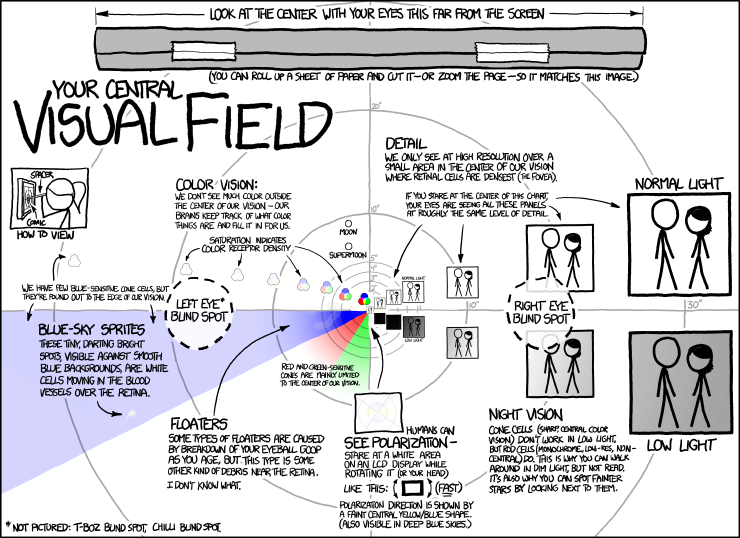
informatik



Karol Myszkowski
Okan Tarhan Tursun

(c) xkcd.com
As computer graphics is producing images and videos that are ultimately perceived by a human, it's mandatory to account for how the human visual system (HVS) is processing this information. The HVS is complex, exhibiting many non-linearities as well as feedback and is only partially understood. While this poses a challenge, it can also be seen as an opportunity which can be exploited in image compression, watermarking, denoising, enhancement, upsampling, etc. Computational models which can predict the human response to the distortion of visual content are important when this opportunity is taken. To this end, our course covers the basic theory of perception research, including
and the practical applications in computer graphics, including
The target audience are students in computer science or related fields. This course covers topics from psychology and physiology that are relevant to computer graphics, and novel perception research and applications in computer graphics and vision. The objective is to transfer knowledge, experience and competencies that are required for doing research in perceptual computer graphics, and that are useful in many related fields, such as experimental psychology, or usability studies in human-computer interaction.
| Prerequisites: |
Computer graphics and image processing, and the related math. |
|---|---|
| Language: | English. |
| Evaluation: |
Final exam (written)
Thursday, 21.02.2019. Time: 14:15-15:45. Place: lecture hall 001 in E1 3 (CS).
Re-exam Wednesday, 20.03.2019. Time: 12:15-13:45. Place: lecture hall 001 in E1 3 (CS). |
| Lecture time: | Wednesday, 12:00-14:00 |
|---|---|
| First lecture: | Wednesday, 17.10.2018 |
| Room: |
Building E1 4 (Max-Planck-Institut für Informatik), Room 019 Please note that Room 019 is reserved for a workshop on 16.01.2019. Therefore, we are going to have our lecture in Room 021 instead of Room 019 on that day. |
| HISPOS: The examination number is 10572. |
Schedule:
Course resources: Send an email to Okan Tarhan Tursun for the password. No password required if you're on the campus network. If you cannot play videos on your web browser, please try downloading the file and opening it with a media player on your computer. You may use free and open-source VLC media player.
The following list contains the most relevant books for this lecture:
Further literature will be announced during the course.